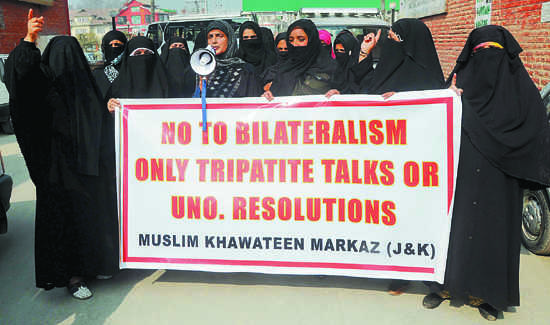With interlocutor Dineshwar Sharma in Srinagar for talks with all stakeholders, the separatists are not too keen on joining the dialogue process initiated by the Modi government.

Women separatists protest the visit of Dineshwar Sharma, the Centre’s interlocutor for J-K, in Srinagar on Monday. Pic: Mohammad Amin War
Arun Joshi
Kashmiri separatists declared on Sunday that they “cannot disappoint” their people by talking to the Centre’s new interlocutor Dineshwar Sharma as that would be a betrayal of “sacrifices” made for the “sacred cause”. The “sacred cause”, in common perception in Kashmir, is “azadi” or independence from India and Pakistan. It is a rejection of the two-nation theory as also plebiscite.Syed Ali Shah Geelani, speaking on behalf of the separatists, particularly moderates Mirwaiz Umar Farooq and Jammu Kashmir Liberation Front chief Yasin Malik who had collected more than three million signatures from Kashmiris for “azadi”, decreed that no section of the Hurriyat Conference would talk to the interlocutor. The gag order has a ripple effect in non-separatist camps as well. The civil society has maintained a distance from Sharma.Geelani’s aim is to discredit the dialogue process initiated by the Modi government. The majority in the Valley is for “azadi”. Thousands have died for this cause and the end to the conflict is not in sight. Although Geelani, the Hizb-ul-Mujahadeen and some other groups have been asking for right to self-determination as envisaged in the United Nations Security Council resolutions of 1948-49, the fact is that those fighting the Indian security forces were doing so for their “complete independence,” and not for Pakistan. They were grateful to Pakistan for its help to the militants, but not obliged to let Pakistan declare Kashmir as its fifth province.Just when Dineshwar Sharma arrived in Srinagar, Pakistan Prime Minister Shahid Khaqan Abbasi told an audience in London that “an independent Kashmir is not possible.” This has poured cold water on the hopes of those believing that Pakistan was helping them achieve freedom and since then, separatists have gone in a silent mode.The current Kashmir “mood” can be understood in three constituencies: (1) the sections of silent people who want peace and normal relations with Pakistan with status quo on borders and some dignified measures to give them a sense that they got something at the end of the day. (2) the vast majority that have made their political, geostrategic and economic calculations in which an independent Kashmir is viable and internationally important place; and (3) the traditional pro-Pakistanis since 1947. It would be wrong to assume that the sections that want to live with India will ever speak out. These sections are mute and they live in peripheries and sectarian enclaves in the Valley. Given this scenario, the public mood is to air day-to-day grievances before the interlocutor. This way, their calls for economic and political uplift and good governance would reach Delhi.The separatists are caught in their own web. For 30 years, they have been promising “azadi”. Over 50,000 people have died, a few thousands have disappeared or are languishing in Pakistan-occupied Kashmir. A vast majority of them are desperate to come back to their homes here from across the Line of Control. This raises a question: why are the misguided youth, fired to “liberate their motherland”, are desperate to return home if Pakistan was such a heaven.Even if separatists’ argument is taken at its face value that it is fruitless to meet the Centre’s interlocutor, what is the option — Pakistan is promoting the idea of Pakistan-only option for Kashmiris. The PoK is better known to them as a “terrorist state’. Geelani’s skepticism to talks emerges from the past experience with Delhi in which the Centre flinched at implementing the reports of its own men to resolve the Kashmir issue. Even National Conference President Farooq Abdullah has said: “Not much is expected of the new interlocutor.” But a larger point is being missed. Apart from Pakistan’s machinations to stall any Delhi-Srinagar dialogue, there is a problem with the Kashmiri leadership, particularly with the separatists: their clock is stuck in the mid-twentieth century. The electoral parties — National Conference and Peoples Democratic Party — have their agendas rooted in autonomy and self-rule, respectively, but the separatists have no such roadmap. Separatists have only their assertions: “We will not disappoint our people,” “they will not hesitate to offer sacrifices, even at the cost of their life.”Since Sharma has not challenged the Pakistan premier, it is spreading disappointment among the people here. They want to know the status of “azadi”.Any leadership should have asked Sharma what he has to offer (essentially, a direct question to Modi). Delhi cannot afford to repeat its mistake if it has to replace the disappointment on the ground with optimism. The Kashmir imbroglio
- The majority in the Valley is for “azadi” and an end to the conflict is not in sight even after thousands of deaths.
- Pakistan Prime Minister SK Abbasi told an audience in London that “an independent Kashmir is not possible.”
- The Kashmiris want to know the status of “azadi” since despite Pakistan’s help, they have never wanted Pakistan to rule over them. Their “sacrifices” have been for “azadi” only.
ajoshi57@gmail.com
